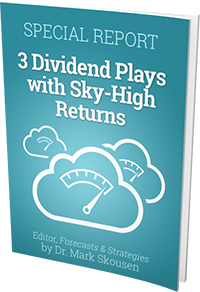By Harry Domash
Unlike most stocks, where you only make money by selling them for more than the purchase price and any related commission, dividend stocks pay you for simply owning them.
Since you’re receiving regular cash payments, you can score a worthwhile return even in a weak market. Even better may be buying them in a strong market, when you’ll likely enjoy share-price appreciation plus dividend income.
Of course, gaining the dual benefits of capital appreciation and dividend income under all conditions is not easy. In a down market, dividend stocks drop, too. So, you must be prepared to hold your stocks through market downturns. Further, it is important to pick solid companies with strong business prospects that will survive whatever the economy throws at them.
Dividends Defined
If you are new to dividend investing, here are a few basics. Dividends are cash payments that companies make to shareholders based on the number of shares that they hold. Most U.S.-based companies pay dividends quarterly. So, you receive income from those holdings every three months. But some companies pay monthly dividends, while others pay annually or semi-annually (every six months).
Aside from those periodic payments, companies sometimes declare one-time or special payouts. These could be in addition to the firm’s regular payouts. In addition, companies that don’t pay regular dividends might declare a special payout from time to time.
Normally, your broker adds the dividends received from stocks to your cash account. Most brokers, however, also offer automatic reinvestment plans. With these plans, your broker uses the dividends to purchase additional shares, even if the dividend equates to only a fraction of a share. Your broker may not charge for this service. If you don’t need the cash for expenses, you should always take advantage of your broker’s dividend reinvestment services.
Dividend Yield
The term dividend yield is analogous to the interest rate that you receive on a savings account. A key difference, of course, is that investing in stocks does not provide any government protection from the loss of your principal, unlike bank accounts.
The yield that you receive on a stock is the total dividends collected for 12 months divided by the price that you paid for the shares. For instance, you would have earned a 10% yield if you paid $10 per share and received dividends totaling $1 during a 12-month period.
If, however, on the day after you bought shares, somebody else paid $11 per share for the same stock, their yield would drop to 9.1% ($1.00 divided by $11.00).
The yields published on financial websites assume that the amount of the last declared dividend will continue to be paid unchanged for the next 12 months. For instance, if a company declared a $0.25 per share quarterly dividend, most websites assume that it will pay dividends totaling $1.00 over the next 12 months when computing yield. Of course, that often doesn’t happen. Most companies modify their quarterly payout amounts from time to time.
Dividend Dates
Here’s the terminology that you need to know about dividend dates.
Declaration Date: the day that the Board of Directors declares the next dividend.
Owner of Record Date: when a company declares a dividend, it specifies the owner of record date, which is the date it uses to determine who gets the dividend. But, you don’t become the owner of record of a stock until three business days after you’ve made the purchase. That three-day lag is termed the “settlement period.”
Ex-Dividend Date: you must purchase a stock at least one day before the ex-dividend date to collect a dividend. Because of the settlement period, the ex-dividend date is two business days prior to the owner of record date.
Payment Date: date the dividend is deposited into your brokerage account.
In a nutshell, you only have to own a stock one day to collect a dividend. That is, you could purchase a stock one day before the ex-dividend date, sell on the ex-date, and still collect the dividend.
Dividend-Paying Stock Categories
Dividend paying stocks fall into three major categories: 1) Federal Corporate Tax Payers. 2) Federal Income Tax Exempt Corporations, and 3) Master Limited Partnerships (MLPs) and Limited Liability Corporations (LLCs).
Federal Corporate Tax Payers: Stocks in this category are issued by utilities, banks and companies that make products or sell services. Their dividends are subject to a 15% or 20% maximum federal income tax rate, depending on your taxable income level. Dividend yields generally top out in the 4% to 5% range.
Federal Tax Exempt: These are the stocks of companies that are granted special status by U.S. laws and don’t pay federal corporate taxes as long at they pay a specified percentage of earnings to shareholders in the form of dividends. Their dividends are not subject to the 15% to 20% limit and are subject to ordinary income tax rates. These entities include Real Estate Investment Trusts (REITs) and Business Development Companies (BDCs). Typical dividend yields are 4% to 12%.
MLPs and LLCs: These kinds of firms trade on major stock exchanges, similar to regular corporate stocks, but are organized as partnerships. Tax returns are more complicated than for corporations, but taxes on a sizable portion of dividends (technically distributions) often can be delayed until you sell. They typically distribute yields of 5% to 12%.
Picking Dividend Stocks
You’ll always do best by picking stocks that increase their payouts while you own them. When that happens, your dividend yield increases and the dividend increase often drives the share price higher. Conversely, a dividend cut hurts you in two ways. Your yield drops and the dividend cut usually pressures the share price.
How do you find the stocks that are most likely to hike their dividends? Strategies for spotting the best candidates vary with industries and with dividend categories. We’ll explore the details in future articles. However, there is one universal truth that applies to all.
History: the Best Teacher
Barring a major management shift, firms with a consistent dividend growth history covering many years are probably committed to continuing that policy. Companies that follow such a rising dividend policy are your best candidates. Conversely, companies that haven’t consistently increased dividends probably prefer to use their extra cash for other purposes. They likely will disappoint you if you want to buy shares in a company that has a rising dividend policy.
Harry Domash, author of the best selling fundamental analysis book, “Fire Your Stock Analyst,” publishes DividendDetective.com, a site specializing in high-dividend investing.

![[coin put into piggy bank]](https://www.stockinvestor.com/wp-content/uploads/shutterstock_77614246.jpg)



